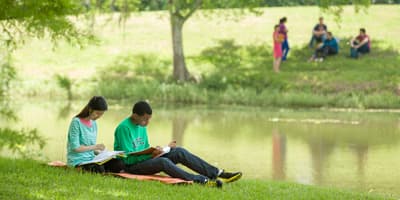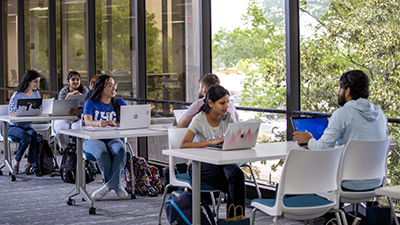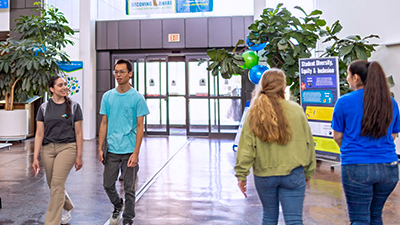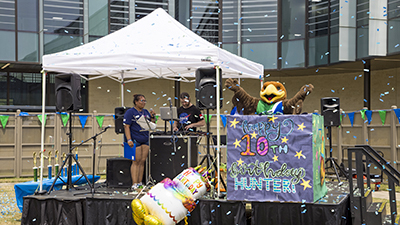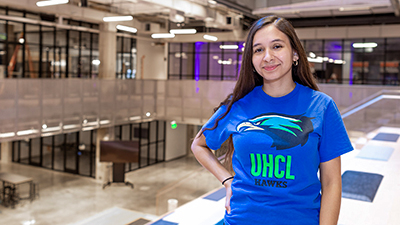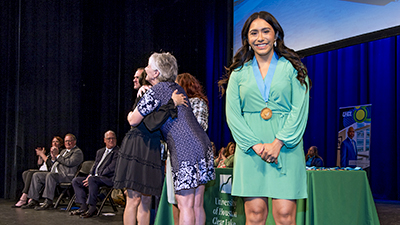UHCL prof enjoys commencement: 'It's an important reminder of why we are here'

Over 1,200 University of Houston-Clear Lake students successfully completed their academic journey at spring commencement, which took place on May 13 at NRG Arena. This number—a record high for the university, can be attributed in part to the commitment demonstrated by their professors, many of whom enjoy witnessing the culmination of their students’ achievements so much, they almost never miss a ceremony.
Associate Professor in Anthropology and Cross-Cultural Studies Maria Curtis said she makes sure she goes to one ceremony a year, if not each semester. She was among approximately 80 professors who attended one of the day’s two sessions.
“I am the first person in my family to walk across a stage and graduate, and I very clearly remember the look on my parents’, grandparents’ and siblings’ faces when
I graduated, and I realized how meaningful that was,” she said. “I come from a working-class family. They encouraged me to go to school. I had a job—sometimes multiple jobs, and I paid my way and I had scholarships.”
She said that’s when she learned that beyond being in college, education was supposed to bring a kind of ease to life. “You have more options, and you don’t have to have that paycheck-to-paycheck mindset. You can have time to think and do other things,” she said. “It’s fine to be hard working and I appreciate my parents instilled that in me, but the worry about how to pay for things was not easy. I never thought of myself as a person who would fit into the educational sphere, but then I heard about a scholarship offered through my grandfather’s employer, who had worked very hard in his life.”
Her grandfather was the one who encouraged her to apply for this scholarship so that she could work less and study more. “The scholarship allowed me to work less and join a research group with my anthropology professor,” she recalled.
She said that was the scholarship that made her think about going on to graduate school and even studying abroad—two things no one in her family had ever done.
“When I graduated, that’s when it dawned on me what a big deal it was. My family really honored it. My grandmother was the child of sharecroppers. She was just beside herself when I graduated. There are no words to explain how much it meant to her. She said that my education had given me a different confidence, which I hadn’t realized.”
As an anthropology professor, Curtis said that she’d taught students from all over the university because of the diversity course requirement.
“I’m the one who’s reading the list of students graduating in the College of Human Sciences and Humanities,” she said. “I’m so excited to see how many students I know. I think about each student’s struggles and their ups and downs. We all had them. A lot of our job as professors is to just to tell students to keep going and that they can do it.”
She said she reflected on the fact that as she read the names, there was a tremendous lifetime accomplishment behind each one, as well as for the family members sitting in the crowd. “It never bothers me when people are screaming in the audience,” she said. “They are so excited. There is so much joy. They have earned this day.”
Curtis said that in reading the names before graduation, she identified at least 20 different languages.
“It is incredible to think about our student diversity and take in the fact that there were proud parents and grandparents in the audience whose hopes for their graduates may have once started in so many distant places,” she said.
And as she listens to the shouts from happy family members in the audience, Curtis said she was happy to be with her colleagues in that moment.
“There is a day-to-day grind during the semester with exams, grading, and prepping for teaching, but to see my colleagues in such a happy moment, it’s very special, and it’s an important reminder of why we are here,” she said. “Most of our students are in the same situation I was in. Students think professors operate in a different dimension where things are somehow easier for us, but they don’t realize we faced similar struggles to get our degrees and how much we identify with them.”
And that, she said, is why she goes to commencement.
“I’m reading some of the names of my own students and I’m so excited about that,” she said. “Even if they’re not in my program, I have had many in my classes and I am honored to witness this important rite of passage.”
She said students often have self-confidence issues to overcome and this is why graduation is so beautiful—they have stuck with it, they did their best, and they grew and persevered.
“They probably learned that the journey to the end of degree is not about perfection but staying the path, learning new content material, but also learning about how to tap into their own unique strengths,” she said. “They did the work, they made it, and now they’re here.”
